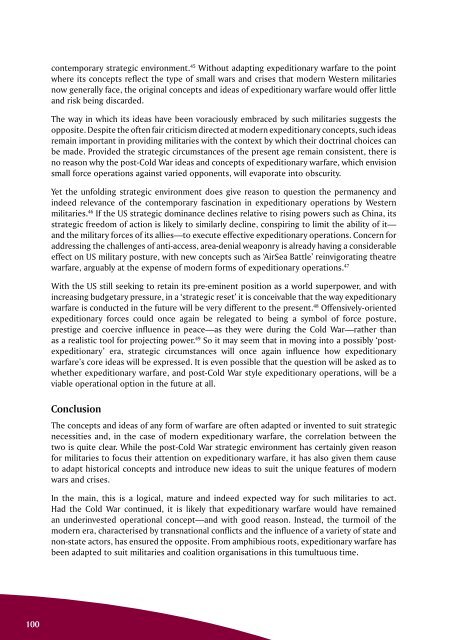190%202013%20Mar_Apr
190%202013%20Mar_Apr
190%202013%20Mar_Apr
Create successful ePaper yourself
Turn your PDF publications into a flip-book with our unique Google optimized e-Paper software.
100<br />
contemporary strategic environment. 45 Without adapting expeditionary warfare to the point<br />
where its concepts reflect the type of small wars and crises that modern Western militaries<br />
now generally face, the original concepts and ideas of expeditionary warfare would offer little<br />
and risk being discarded.<br />
The way in which its ideas have been voraciously embraced by such militaries suggests the<br />
opposite. Despite the often fair criticism directed at modern expeditionary concepts, such ideas<br />
remain important in providing militaries with the context by which their doctrinal choices can<br />
be made. Provided the strategic circumstances of the present age remain consistent, there is<br />
no reason why the post-Cold War ideas and concepts of expeditionary warfare, which envision<br />
small force operations against varied opponents, will evaporate into obscurity.<br />
Yet the unfolding strategic environment does give reason to question the permanency and<br />
indeed relevance of the contemporary fascination in expeditionary operations by Western<br />
militaries. 46 If the US strategic dominance declines relative to rising powers such as China, its<br />
strategic freedom of action is likely to similarly decline, conspiring to limit the ability of it—<br />
and the military forces of its allies—to execute effective expeditionary operations. Concern for<br />
addressing the challenges of anti-access, area-denial weaponry is already having a considerable<br />
effect on US military posture, with new concepts such as ‘AirSea Battle’ reinvigorating theatre<br />
warfare, arguably at the expense of modern forms of expeditionary operations. 47<br />
With the US still seeking to retain its pre-eminent position as a world superpower, and with<br />
increasing budgetary pressure, in a ‘strategic reset’ it is conceivable that the way expeditionary<br />
warfare is conducted in the future will be very different to the present. 48 Offensively-oriented<br />
expeditionary forces could once again be relegated to being a symbol of force posture,<br />
prestige and coercive influence in peace—as they were during the Cold War—rather than<br />
as a realistic tool for projecting power. 49 So it may seem that in moving into a possibly ‘postexpeditionary’<br />
era, strategic circumstances will once again influence how expeditionary<br />
warfare’s core ideas will be expressed. It is even possible that the question will be asked as to<br />
whether expeditionary warfare, and post-Cold War style expeditionary operations, will be a<br />
viable operational option in the future at all.<br />
Conclusion<br />
The concepts and ideas of any form of warfare are often adapted or invented to suit strategic<br />
necessities and, in the case of modern expeditionary warfare, the correlation between the<br />
two is quite clear. While the post-Cold War strategic environment has certainly given reason<br />
for militaries to focus their attention on expeditionary warfare, it has also given them cause<br />
to adapt historical concepts and introduce new ideas to suit the unique features of modern<br />
wars and crises.<br />
In the main, this is a logical, mature and indeed expected way for such militaries to act.<br />
Had the Cold War continued, it is likely that expeditionary warfare would have remained<br />
an underinvested operational concept—and with good reason. Instead, the turmoil of the<br />
modern era, characterised by transnational conflicts and the influence of a variety of state and<br />
non-state actors, has ensured the opposite. From amphibious roots, expeditionary warfare has<br />
been adapted to suit militaries and coalition organisations in this tumultuous time.


